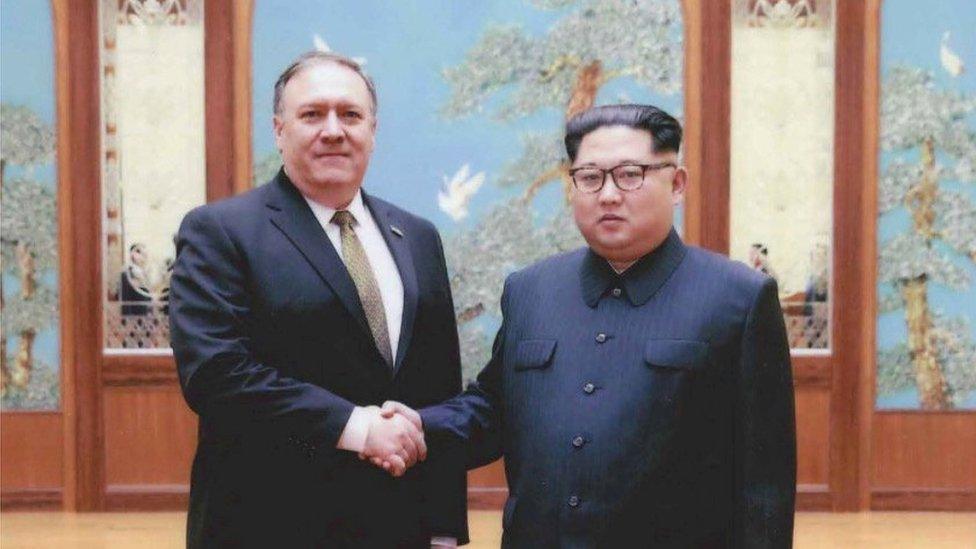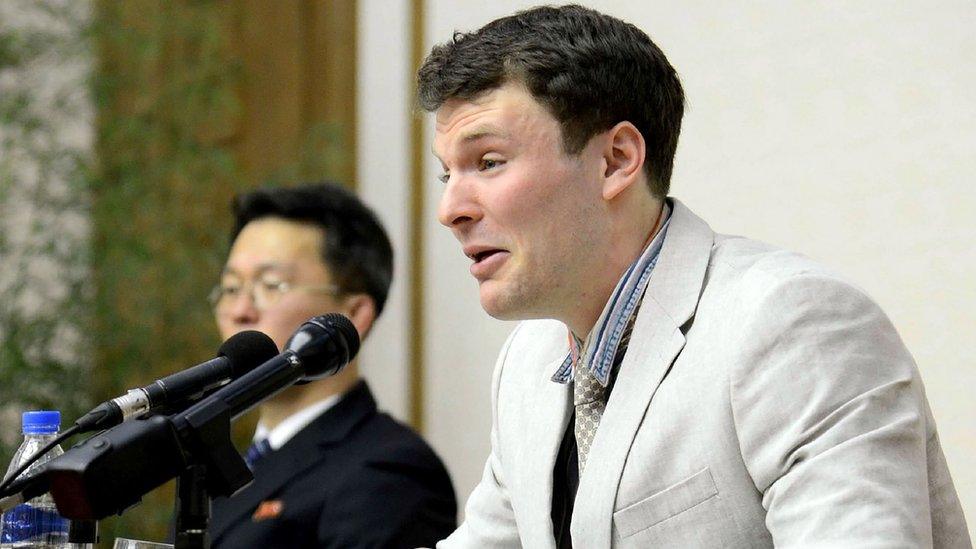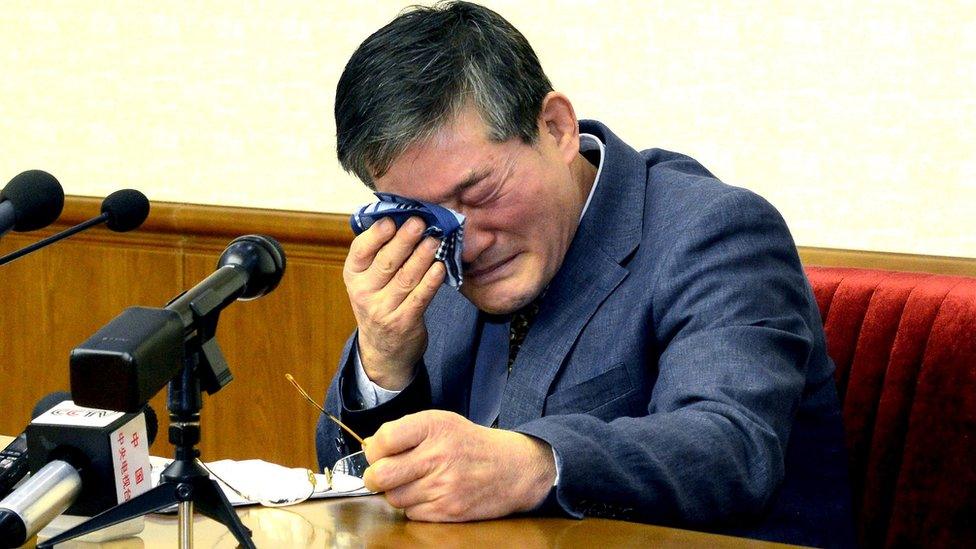North Korea frees three US detainees ahead of Trump summit
- Published

Left to right: Kim Hak-song, Kim Dong-chul, Tony Kim
North Korea has freed three US citizens from prison, according to a tweet from US President Donald Trump.
It is viewed as a goodwill gesture ahead of a historic summit between Mr Trump and North Korea's Kim Jong-un.
Mr Trump said he would greet the men when they return with Secretary of State Mike Pompeo, who has been in Pyongyang to arrange the planned talks.
Kim Hak-song, Tony Kim and Kim Dong-chul boarded the plane "without assistance", the White House said.
They had been jailed for anti-state activities and placed in labour camps.
Mr Trump announced the release of the men in a tweet on Wednesday.
Allow X content?
This article contains content provided by X. We ask for your permission before anything is loaded, as they may be using cookies and other technologies. You may want to read X’s cookie policy, external and privacy policy, external before accepting. To view this content choose ‘accept and continue’.
"They seem to be in good health," he wrote, adding that a date and location had been set for talks after Mr Pompeo held a "good meeting" with Kim Jong-un.
Reporters travelling with Mr Pompeo said their meeting lasted about 90 minutes.
In his tweet, Mr Trump added that he would personally greet the detainees, external when they arrive at Andrews Air Force Base at 02:00 EDT (06:00GMT) on Thursday.
In later remarks, Mr Trump said that the location for the talks would be announced "within three days".
Donald Trump and Kim Jong-un: From enemies to frenemies
He added that they will not take place in the demilitarised border zone between North and South Korea known as the DMZ.

Who are the freed Americans?
Kim Hak-song was held on suspicion of "hostile acts" in May 2017. He had previously described himself as a Christian missionary who intended to start an experimental farm at the Pyongyang University of Science and Technology (PUST)
Tony Kim, also known as Kim Sang-duk, also worked at PUST. He was detained in April 2017 on espionage charges. According to South Korean media, he had been involved in humanitarian work in the North.
Kim Dong-chul, a pastor in his early 60s, was detained in 2015 on spying charges, and was then sentenced to 10 years hard labour.

One of the detainees was jailed in 2015, the other two have been in prison for just over a year. Their convictions have been widely condemned as political and an abuse of human rights.
Ahead of his visit, the second to North Korea in under six weeks, the secretary of state said that he hoped North Korea would "do the right thing" and release the detainees.
Allow X content?
This article contains content provided by X. We ask for your permission before anything is loaded, as they may be using cookies and other technologies. You may want to read X’s cookie policy, external and privacy policy, external before accepting. To view this content choose ‘accept and continue’.
The fate of the detainees has been a key factor in the build up to the Trump-Kim meeting.
What has the reaction been?
South Korea's presidential Blue House welcomed the release of the Americans, saying it would have a "positive effect" for upcoming negotiations.
Blue House spokesman Yoon Young-chan also called upon the North to release six South Korean prisoners.

Mike Pompeo, the top US diplomat, has met the North Korean leader twice in under six weeks
"In order to reinforce reconciliation between South Korea and North Korea and to spread peace on the Korean peninsula, we wish for a swift repatriation of South Korean detainees," Mr Yoon said.
In a statement provided to the BBC, external, the family of Tony Kim said they "want to thank all of those who have worked toward and contributed to his return home".
"We also want to thank the President for engaging directly with North Korea," the family said.

Can South Korea achieve the same?
Analysis by Laura Bicker, BBC News, Seoul
The US has made progress where South Korea has not. President Moon Jae-in raised the issue of six South Koreans held in the North during his historic meeting with Kim Jong-un at the border.
But there is no homecoming for them. A statement from the Presidential palace in Seoul states that they hope they will be returned soon given the "atmosphere of peace that has begun on the Korean peninsula".
Since the end of the Korean War, 3,835 South Koreans have been taken by the North. Of those, 3,319 were allowed to return or escaped, according to a study by the Asan Institute in Seoul. That means there are 516 people whose fate in North Korea is not known.
North Korea maintains many of those from the South remain of their own free will. But their families disagree and call for independent verification.
Then there are the divided families. Divided by lines drawn to separate the two Koreas after war or divided because some in the family chose to defect to the South.
I met one teenager who hasn't seen her mother since January 2011. She remembers the exact time they said goodbye.
The start of the peace process has seen the reunification of three Korean American families. As the negotiations continue, the hope here in South Korea is that there will be many more reunions to come.

What are North Korean prisons like?
Some 120,000 people are believed to be imprisoned in North Korea without due process, according to the Committee for Human Rights in North Korea (HRNK).
People can be jailed by the regime for almost anything, activists say, with crimes ranging from watching a South Korean DVD to trying to defect from the country.
Political prisoners are often sent to separate prisons - usually brutal labour camps, which involve difficult physical work such as mining and logging.

Warmbier died less than a year after his tearful confession in Pyongyang
American missionary Kenneth Bae, who was sentenced to hard labour, was himself forced to work on a farm six days a week despite being in poor health.
The last American to be freed - Otto Warmbier, who was jailed for stealing a hotel sign - was released last year but was fatally ill, and died shortly after returning home.
His parents, Fred and Cindy Warmbier. said they were "happy for the hostages and their families. We miss Otto".

More on North Korea
The unlikely triangle: Trump, Rodman and Kim Jong-un
- Published9 May 2018
